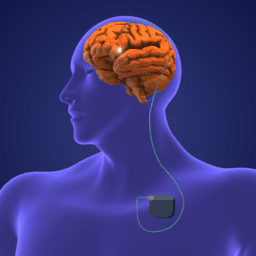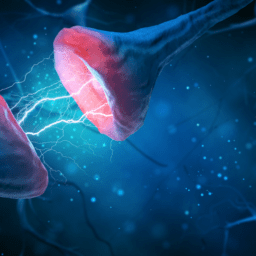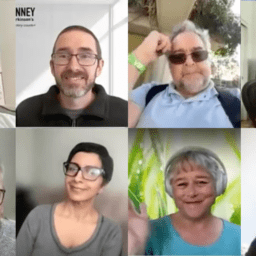This month’s “What’s New in Parkinson’s” post highlights a levodopa infusion pump system approved for use in the UK, preclinical research into estrogen and Parkinson’s, a proposed ban of trichloroethylene in the US, and protective effects of Tai Chi.
Read on for the rest of October’s news!
SCIENCE AND RESEARCH Updates
- A formulation of carbidopa-levodopa delivered by infusion pump was approved in the UK. This treatment delivers carbidopa-levodopa 24 hours a day using a small, portable device that can be refilled at home.
- A large study finds that loneliness is associated with increased risk of Parkinson’s across demographic groups, independent of depression and other prominent risk factors. Terracciano et al. discuss multiple possible explanations for their findings.
- Thomas et al. presented an abstract at the MDS international congress explaining that “the abrupt reduction of estrogen levels during the perimenstrual period may contribute to reduced responsiveness to dopaminergic treatment during menses.”
- An estrogen receptor agonist has been found to have neuroprotective potential in models of Parkinson’s. More information about this research is available here.
- A common fungal species that lives on human skin has been found in larger quantities on the skin of people with Parkinson’s, suggesting that it could be a non-invasive biomarker for Parkinson’s.
- A large team of researchers is undertaking work to transform Parkinson’s care in Africa, where resources and education about Parkinson’s is lacking.
- The EPA has proposed a ban of trichloroethylene, a chemical associated with Parkinson’s.
- A study of over 3 million people in Norway finds associations between Parkinson’s and classes of prescription medications. Some classes were associated with increased risk or developing Parkinson’s, while others were associated with decreased risk.
- Inhibikase released “encouraging” data about the first 11 participants in a trial of risvodetinib, a potential disease-modifying treatment. Another trial of the drug is now recruiting participants.
- Inhibikase announces approval to start research into risvodetinib as a possible treatment for MSA.
- Joanne Taylor from Gain Therapeutics describes the possible use of neurofilament light chain as a biomarker for Parkinson’s.
- Gain Therapeutics has begun a phase 1 trial for GT-02287. Earlier data suggests that GT-02287 may restore function lost due to GBA1 gene mutations.
- In NPJ, Sotirakis et al. report on the use of wearable sensors to compliment rating scales like the UPDRS and improve identification of motor symptom progression.
- Another article in NPJ discusses the use of wearable technology to monitor motor fluctuations.
- Researchers investigating PSP report that MRI scans may be able to help develop a prognosis and understand mortality risks for people living with PSP.
- In Cell Stem Cell, researchers share a detailed overview of one approach to stem cell research and trials for people with Parkinson’s.
- A small study of 30 former high-level contact sport athletes found that 20% of participants had abnormal alpha-synuclein in their cerebrospinal fluid.
- AbbVie has purchased a company working on a novel treatment that aims to address mitochondrial dysfunction as a new disease modifying strategy for Parkinson’s.
- Researchers in Holland have released the protocol for a fecal microbiome transplant study. Preclinical research provides reason to think fecal transplantation might be helpful for people with Parkinson’s, but trial design for such research is complicated.
- Funded by grants from Parkinson’s UK, Scottish researchers are building a new preclinical model for Parkinson’s and investigating a genetic link that may protect against developing Parkinson’s.
- Bayer has opened a new facility to produce stem cells used in cell regeneration for Parkinson’s and other conditions.
- Researchers report that in a rat model of Parkinson’s impaired cognitive and motor function occurred coincidentally with levodopa-induced dyskinesia. They share that “impaired cognitive and motor performance were evident only in dyskinetic [animals]” in the study.
- Aspen Neuroscience has been granted Fast Track Designation for a new investigational personalized cell therapy.
TREATMENT and Therapy Updates
- Tai Chi has a long-term benefit for people with Parkinson’s. A recent study reports that Tai Chi “reduced the annual changes in the deterioration of the Unified Parkinson’s Disease Rating Scale and delayed the need for increasing anti-parkinsonian therapies.” The BBC featured a news story about the study’s findings.
- While not specifically focused on Parkinson’s, a report in Neurology found that “frequent vigorous and other exercises, housework-related activity, and friend/family visit [were] associated with a lower risk of dementia.”
- People living with Parkinson’s who have GBA variants experienced greater likelihood of cognitive changes following DBS surgery, but responded similarly to those without GBA variants in terms of motor improvement and other measurements (including those related to motor fluctuations). The authors share, “only cognitive scores worsened significantly faster in GBA-PD after 3 years. Overt dementia was diagnosed in 11% non-GBA-PD and 25% GBA-PD at 5-year follow-up.”
- An article published by The Lancet describes demographic and socioeconomic discrepancies in DBS utilization in the United States.
- Researchers from Holland report on the benefits of a variety of community-based exercise programs, including boxing, kayaking, pilates, dance, and tai chi.
- The Journal of The Neurological Sciences has published an article which reports that non-steroidal anti-inflammatory medications like aspirin and ibuprofen do not appear to affect Parkinson’s progression when taken in low doses.
LIVING WELL STORIES
- The East Oregonian newspaper features a story about how Davis Phinney Foundation ambassador Carol Clupny, her husband Charlie, and their new service dog Leroy live well with Parkinson’s together.
- A care team that takes patient-centered approaches to care can help you live well with Parkinson’s. Professor Camille Carroll discussed this subject during this year’s Edinburg Parkinson’s lecture.
- Comedian Richard Lewis is increasingly opening up about his Parkinson’s diagnosis, and says he views this as a first step toward increased Parkinson’s advocacy.
- A professor in Connecticut has multiple projects to support the hispanic Parkinson’s population.
- A news story from New York highlights a Pedaling for Parkinson’s program.
- Elva Brown considers DBS and a local organization hosts an educational event about the treatment in San Antonio.
- Iowa State hosts an educational event for people with Parkinson’s.
- Mike Michaud shares his story of living with young onset Parkinson’s and the creation of Parky Chat.
SURVEYS, CLINICAL TRIALS, AND VOLUNTEER OPPORTUNITIES
- Texas Tech in Lubbock, TX is undertaking a study into the effects of Parkinson’s on family functioning.
- Researchers in Holland are enrolling participants in a trial aiming to evaluate the use of motivational smartphone apps to increase exercise program adherence.
- Inhibikase is recruiting participants for a phase 2 trial of a new c-Abl tyrosine kinase inhibitor. In a press release, Inhibikase says their research “has validated the critical role that c-Abl plays in the initiation and progression of Parkinson’s disease, as well as the potential of IkT-148009 as a promising new approach to disease modification.” This trial will also be among the first to utilize recently validated alpha-synuclein seed assay tests.
- The International Parkinson and Movement Disorders Society (MDS) is developing a new electronic diary (e-Diary): a digital solution for Parkinson’s. This e-Diary is intended to better characterize how the disease affects daily life. The society invites people to participate in a survey intended to help aid the design of this new tool.
- A new trial studying Gemfibrozil, a drug that decreases fat production in the liver, is set for a phase two clinical trial in people with Parkinson’s. This trial will enroll people between 40 and 75 years of age who have not begun taking medication for Parkinson’s.
- The Speech Accessibility Project (SAP) seeks volunteers for a research initiative aiming to make voice recognition technology more useful for people with a range of diverse speech patterns. More information is available here and here. To determine whether you are eligible to participate, visit the SAP registration page.
- A team of Dutch researchers created PregSpark, a registry for women with Parkinson’s who are pregnant or have recently given birth. The goal is to build an online international pregnancy and Parkinson’s registry. This registry will prospectively and uniformly collect data on the course and outcome of as many as possible pregnancies in women with Parkinson’s. This data will help women with Parkinson’s make more informed decisions about pregnancy and improve the quality of care pregnant women with Parkinson’s receive. The PregSpark site is currently under construction but should be completed soon.
- A phase 1b trial is recruiting volunteers for a study of a treatment that aims to influence inflammation.
- Researchers in Norway are investigating the efficacy of ambroxol in people with dementia with Lewy bodies.
- Researchers in the UK, in partnership with the Women’s Parkinson’s Project and MyMovesMatter, invite participation in a survey about the experience of menopause for women with Parkinson’s.
- Another study of ambroxol is launching: The DUPARG study is recruiting participants in Groningen, Netherlands.
- A new trial examining the possible neuroprotective effect of exercise has been listed by the University of Nevada.
- University of Rochester Center for Health + Technology is undertaking a survey study to assess the ability of the Parkinson’s Disease-Health Index to measure patient-relevant changes in disease burden over the course of two years. Participants will complete surveys five times over two years and must be over 18, speak English, and have a self-reported or clinical diagnosis of Parkinson’s. More information is available here.
- Researchers at Columbia University’s Irving Medical Center are seeking participants for a study exploring the role of immune response in Parkinson’s. Participation is open to those with and without Parkinson’s and will involve donating blood, a questionnaire, a cognitive test, and a neurological examination. Click here to express interest in participating.
- Johns Hopkins University has announced a trial to evaluate whether levetiracetam can improve symptoms of Parkinson’s psychosis. The trial is not yet recruiting, but the plan is for it to begin by September. The trial design features a crossover assignment, which means every participant will receive an active trial drug for their participation.
- The LUMA trial continues to recruit participants. This trial aims to assess the safety and efficacy of BIIB122 tablets in slowing the progression of early-stage Parkinson’s. This study has sites in the US, China, France, Germany, the Netherlands, Poland, Spain, and the UK.
- The ACTIVATE trial is recruiting participants for a phase 2 trial of BIA 28-6156 in people with GBA mutations. This 78-week trial has site locations in the US, Canada, and Europe.
- In Colorado, a study the Foundation is funding continues to recruit participants. The study explores low-load resistance training with blood flow restriction to help develop exercise interventions for improved quality of life for people with advanced Parkinson’s.
- Washington University School of Medicine is sponsoring a study aiming to enroll participants with idiopathic REM sleep behavior disorder, as well as healthy controls, in preparation for a trial of neuroprotective treatments against synucleinopathies.
- A study in South Carolina aims to identify brain biomarkers to predict the risk of cognitive change following DBS surgery.
- A survey for those in Ireland seeks to understand the influence of Parkinson’s symptoms and other factors on the quality of life of people with Parkinson’s.
- Another survey for those in Ireland seeks to understand how people access information about Parkinson’s.
- A trial sponsored by the University of Aberdeen in Scotland is recruiting participants for a study of the effects of constipation and changes in the microbiota in Parkinson’s.
- Staying Connected through Communication Study: The University of Washington SPEAC Lab invites individuals living with Parkinson’s to answer survey questions about their communication experiences. This is an online survey study that will take about 30-45 minutes. (Paper surveys are also available.) People with Parkinson’s and their family/friends/coworkers will complete SEPARATE surveys, and data are not shared between participants. This study is open to anyone in the US. Each participant will be mailed a $25 check upon survey completion.
- PreActive PD Study: This study, available for both English and Spanish speakers, implements an occupational-therapist-delivered physical activity behavior change coaching intervention in people with early-stage Parkinson’s. The study is based upon a recent single-arm cohort feasibility study (Pre-Activate PD/HD) that evaluated acceptability, implementation, and resulting effect estimates of the Pre-Activate PD intervention in 13 participants. The intervention provides one-on-one coaching sessions from an occupational therapist to individuals newly diagnosed with Parkinson’s. The individualized structured support in the sessions is aimed at facilitating and optimizing exercise uptake as part of an effective self-management program.
- Gamma Wave Trial: Sponsored by the Massachusetts Institute of Technology (MIT), this trial investigates the efficacy of a non-invasive method of neuromodulation called Gamma Entrainment Using Sensory Stimulation (GENUS) for managing Parkinson’s motor symptoms. GENUS is administered via light, sound, and tactile stimulation devices and has been tested on cognitively normal individuals and individuals with mild Alzheimer’s; the device was found to be safe for use and effective for entrainment in both populations.
- Deep Brain Stimulation (DBS) and Exercise Study at Barrow Neurological Institute: This study aims to help researchers learn more about how aerobic exercise affects symptoms of Parkinson’s and the quality of life in people who have DBS. They will also look at brain wave activity using the Medtronic Percept DBS device to better understand what changes in the brain might be caused by exercise and how that affects Parkinson’s symptoms. Phoenix-area residents reach out to Markey if interested.
- Colorado Oral Strengthening Device: The University of Colorado Denver is looking for adults with Parkinson’s to participate in a study exploring how a novel low-technology device can increase tongue strength comparable to standard-of-care exercise using tongue depressors but with the kinematics and simple biofeedback of existing high-cost devices. Research has shown that tongue resistance exercises paired with biofeedback result in improved tongue strength to support chewing, control of food and liquid in the mouth, and propulsion of material for a swallow.
- PD GENEration: The Parkinson’s Foundation announces a major expansion of its national study to make genetic testing and counseling more available for people with Parkinson’s. The study (NCT04057794) hopes to enroll 15,000 people in all 50 US states, Puerto Rico, and the Dominican Republic. For questions about enrollment, email [email protected]. Know someone who speaks Spanish and wants to learn more and maybe participate in the study? Share this link.
- Parkinson’s Progression Markers Initiative: In an expanded study, the Parkinson’s Progression Markers Initiative (PPMI) is currently working to enroll up to 100,000 people with and without Parkinson’s. The study team is especially seeking to enroll people diagnosed with Parkinson’s in the past two years and who are not yet on treatment, as well as people 60 and older who aren’t living with Parkinson’s but have a risk factor for it (such as a close relative with Parkinson’s, a known Parkinson’s-associated mutation, and/or REM sleep behavior disorder). The observational study is also enrolling people with no known connection to Parkinson’s to serve as a control group.
- TOPAZ (Trial of Parkinson’s and Zoledronic Acid): Caroline Tanner, MD, PhD, is recruiting participants for a new remote clinical trial led by a team of Parkinson’s experts at UCSF in partnership with researchers from across the country. The study aims to help people with Parkinson’s or parkinsonism maintain their independence by reducing the risk of hip fractures. The study will test if zoledronate, an FDA-approved medication for osteoporosis, can prevent fractures in people with Parkinson’s–whether or not they have osteoporosis. To learn more, visit the study website at TOPAZstudy.org, email [email protected], or call (415) 317-5748.
- A PD Avengers research group is undertaking a new project called Sparks of Experience, designed to be more systematic about collecting and considering the experiences and ideas that come from the curious minds of people living with Parkinson’s. “In the past, these sometimes quirky ideas inspired by lived experience have turned into significant new directions for research. It could be said we are trying to capture serendipity,” the team says. To learn more and get involved, see the flyer here.
- Game-Based Exercise Project: Researchers at the University of Auckland are investigating how games can be used as potential rehabilitation systems. This project aims to develop suitable game-based exercise experiences to help people living with Parkinson’s. If you are 45 or older, living with a chronic condition such as Parkinson’s, and/or are experiencing age-related health conditions, you are invited to participate in a survey that will help the researchers to understand the community’s interest in games and gameplay in the context of exercise and rehabilitation. To learn more and take the 15-minute survey, see the flyer here.
- SPARX3 – A Phase 3 Clinical Trial about Exercise and Parkinson’s: This research team is currently seeking volunteers to participate in a clinical trial about the effects of aerobic exercise on people with Parkinson’s. Learn more and see if you qualify here. For more details, contact Katherine Balfany at [email protected].
- The University of Oulu and collaborators from Aalborg University, Fraunhofer University, the University of Manchester, the University of Glasgow, the University of Lisbon, and the University of Melbourne are conducting a survey for people with Parkinson’s and care partners about self-care. Complete the survey here to share your self-care strategies and techniques. You can also review ideas submitted by others and add them to your own self-care toolbox.
- Speech and Telemedicine Study: The Purdue Motor Speech Lab
- Parkinson’s and Service Dogs: University of Groningen, Netherlands
- Neurology Study Interest Registry: University of Rochester
For more of what’s new in Parkinson’s news, check out our full series here.
WANT MORE PRACTICAL ARTICLES LIKE THIS?
You can learn much more about living well with Parkinson’s today through our Every Victory Counts® suite of resources. Each manual is packed with up-to-date information about everything Parkinson’s. Click the link below to order your manual(s).

















